Jahresbericht 2017
(Auszug; den vollständigen Bericht können Sie anfordern bei Epona-Stiftung für Pferd und Umwelt c/o Mermagen, Kesselstr. 15, 53797 Lohmar)
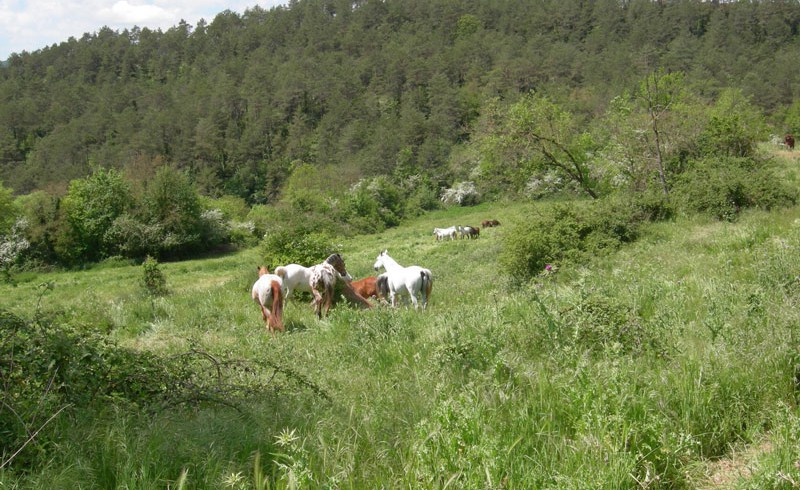
200 Hektar Land für Pferde
In diesem Jahr vergrößerte sich die Finca Mas Casanova (www.mascasanova.org) um 140 Hektar auf 200 Hektar Land mit Wäldern und Bergbächen. Seit über drei Jahren hat die Besitzerin von Mas Casanova, Mercè Oms Molist, an der Vergrößerung gearbeitet. 2017 konnte sie die neuen Pachtverträge endlich unter Dach und Fach bringen, weil alte Pächter in Rente gegangen waren, und sie gute Vorarbeit geleistet hatte. Das war nicht immer einfach gewesen, denn alteingesessene katalanische Bauern davon zu überzeugen, ihr Land an eine junge Frau mit Pferden zu verpachten, braucht viel Einfühlungsvermögen, Geduld und Stetigkeit. Da Mercè in dieser Gegend aufgewachsen ist, wusste sie wie man mit den Bauern verhandeln muss.
Nachdem die Pachtverträge unterschrieben waren, musste Wald gerodet werden, Land gesäubert, Zäune gezogen, Wasserstellen überprüft, gereinigt und eventuell bearbeitet werden. Bisher wurden 20 Hektar Land und Wald geklärt und über 15 km Zäune gezogen, vieles in Eigenarbeit mit der Unterstützung von Familie und Freunden. Die Epona-Stiftung half mit einer Spende bei der Finanzierung der Zäune.
Das kommt nun alles unseren Pferden zugute, die die Weiden wechseln können und so fast immer Grünfutter zur Verfügung haben. Da 2017 ein sehr heißes und trockenes Jahr war, freuten wir uns besonders über die neuen Weiden. Die meisten haben natürliches Wasser von klaren Bergbächen oder Quellen, die kleine Seen bilden. In den Wäldern gibt es Schutz vor der Sonne und der Hitze. Schon nach kurzem konnten wir die Pfade ausmachen, die die Pferde kreuz und quer durch den Wald gezogen hatten. Schnell hatten sie sich an ihre neuen Gebiete gewöhnt und wir hatten unsere Freude daran, sie ausgiebig grasen und spielend über die großen, hügeligen Flächen galoppieren zu sehen. Wenn die Weiden gewechselt werden, gibt es immer eine strenge Rangordnung, unser Pony Toby muß mit der Kaltblutstute „La Gorda“ und dem Fohlen „Miel“ vorneweg marschieren, dann ist alles ok, ansonsten bricht das Chaos aus. Bravo Toby, dass Du für Ordnung in der Herde sorgst.
Cookie, Indu und Jumpy
Unser Pony Cookie (siehe auch den Jahresbericht 2012), das gerne alleine, weit weg von der Herde graste und oft unauffindbar schien, wurde plötzlich gesellig und zum Liebling der Kinder. Seitdem Martin, der Sohn von Mercé und Xevier, in den Kindergarten geht, veranstaltet Mercé regelmäßig mit den Kindern Unterrichtsstunden auf der Weide. Die Kinder lernen die Natur und die Pferde, ihr Verhalten, ihre Sprache, ihre Gewohnheiten kennen. Von Anfang an war Cookie sofort zur Stelle, sobald die Kinder kamen, ließ sich streicheln und der kleine Einzelgänger genoss offensichtlich die Gesellschaft der kleinen Pferdefreunde. Wir staunten und freuten uns über diese Veränderung, denn er war nun auch öfter bei den anderen Pferden zu sehen.
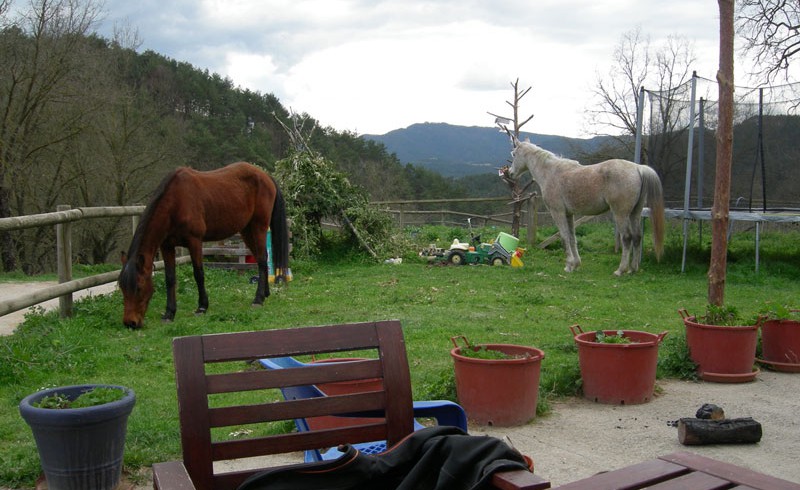
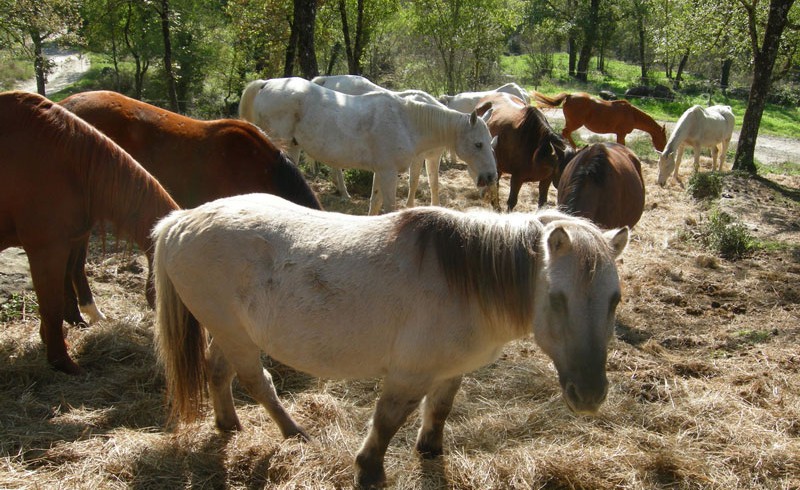
Indu musste erneut ein Zahn gezogen werden, da sie nun kein Heu mehr fressen kann, wird sie mit eingeweichten Heucops gefüttert solange das Gras im Winter nur spärlich wächst. Und kurz nach dem Eingriff durfte sie Rasenmäher sein und das kurze, saftige Gras im Garten fressen. Ihr bester Freund Luc half ihr gerne dabei.
Jumpy machte in diesem Jahr, mit Hilfe der Pferdeosteopathin Silvia Marti Korff, große Fortschritte. Er wurde sehr viel ruhiger und gelassener und scheint es nun fast schon zu genießen, gebürstet und gepflegt zu werden. Nur das Aufheben der Hinterhufe ist noch nicht 100% perfekt, wird aber immer besser, was vor allem auch der Geduld unseres Hufschmieds Xesco zu verdanken ist.
Besuch beim Rescue Centre in Südspanien
Im Herbst reiste die Präsidentin der Epona-Stiftung, Marlies Kamps, in den Süden Spaniens und besuchte unter anderem das Pferdeprojekt „Foundation Easy Horse Care Rescue Centre“ (www.easyhorsecare.net) in der Nähe von Alicante. Die Engländer Sue und Rod Weeding bekommen Pferde, Ponies und Esel aus ganz Spanien. Teilweise sind sie in einem grausamen Zustand, krank, unterernährt, misshandelt. Sie brauchen oft umfassende medizinische Versorgung und Pflege. Um den Tieren zu helfen,ist Sue und Rod kein Aufwand zu groß. Auf einem relativ kleinen Platz leben über 100 Huftiere. Alleine die Reinigung der Unterkünfte und Stellplätze ist ein tagesfüllender Job für mehrere Leute. Trotz der Enge, sieht alles gepflegt und sauber aus, vor allem aber die Tiere, die alle eine individuelle Behandlung und Versorgung bekommen. Mit einer Spende half die Epona-Stiftung dem Easy Horse Rescue Center einen gebrauchten Mini Digger zu kaufen.
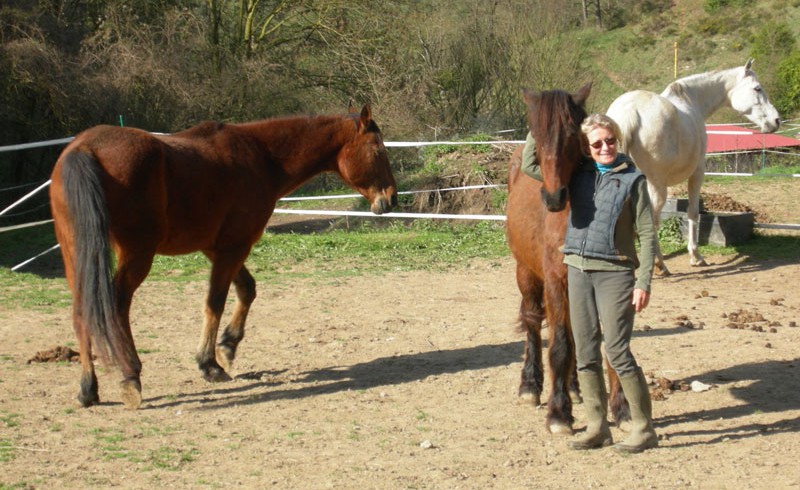
Gesprächsrunde zum Wohlbefinden der Pferde
Ende des Jahres besuchte Eva Reifler von Visionpure (www.visionpure.fr) die Epona-Stiftung. Eva berichtete von ihrem neuen Projekt im Jahre 2018: einer Messe zum Thema Wohlfühlen mit Pferden. Auf dieser Messe, die auf einer alten Rennbahn in der Nähe von Paris stattfinden wird, stellen Equitherapeuten, Yogalehrer, die mit Pferden arbeiten, Trainer für Coaching, Familienaufsteller etc. ihre Arbeit vor. Es gibt zahlreiche Veranstaltungen, Vorträge und Demonstrationen mit Pferden. Als Stargast kommt Linda Kohanov (www.eponaquest.com) aus den USA. Die Autorin und Pferdetrainerin arbeitet seit den 90er Jahren im Bereich der Pferdeunterstützten Therapie, wobei es um Führung, Durchsetzungsfähigkeit, persönliche Ertüchtigung, Beziehungen, Intuitionen und emotionale Fähigkeiten geht.
Eva lud spontan die Epona-Stiftung ein, sich an der Messe zu beteiligen. Schnell waren wir uns einig, dass wir gerne eine Gesprächsrunde zum Thema „Das Wohlbefinden der Pferde“ (Le bien être des chevaux) organisieren und leiten würden. Bisher konnten wir die Tierärztin Dr. Anna Evans, die vor allem für ihre Kommunikationsfähigkeiten mit Tieren weit über die Grenzen von Frankreich bekannt wurde (www.communicationintuitive.com) gewinnen, sowie den Hufpfleger Guillaume Parisot (www.podologie-equine-libre.net/tag/pel/), und den Therapeuten Gautier-Jean Burgat, der mit ausgedienten Rennpferden arbeitet (www.audeladespistes.fr). Der Round-Table der Epona-Stiftung wird am Samstag, 2.Juni 2018, stattfinden (www.salondubienetreaveclecheval.com/programme-detaille/).
Annie Hansemanns reports from Brazil and Eritrea:
Patenkinder und Uerê
Whereas overall Brazil is showing a slight improvement in the economy, Rio de Janeiro’s GDP is still going down. The downturn in oil prices, the huge investments for the sportive mega events, accompanied with a large scale corruption, made Rio de Janeiro insolvent. Public spending almost came to a standstill. Former governors and other public servants as well as managers of influential companies are being imprisoned or prosecuted for embezzlement of public funds and money laundry.
In 2017 Rio de Janeiro had a shortage of 2.200 teachers and particularly in the poor communities the shortage is acute. In some full day schools, children are being sent home at around 2 pm as there is no staff to attend. Teachers, who did not receive their salary in time or only in small installments, are resorting to alternative income opportunities. The conditions in the health care are similar. Staff often must wait for their salary, medical equipment is dysfunctional and many small health posts were forced to shut down due to lack of the most basic things like medicine or bandage. Access to procedures such as appointments to specialist doctors, exams and required surgeries became difficult for
people from the poor communities.
The 2017 crime rate rose 7 % from 2016 and 26 % from 2015, whereby the shortage of
funding for public security is one of the main reasons. The criminal gangs took advantage of the situation and managed to regain control over their lost territories. Whereas in the past years the conditions for the population in the slums were slightly improving, the people now again are being taken hostage by the ruling drug factions as well as by often corrupt and repressive police forces. Armed disputes between rival gangs or clashes with police forces occur almost daily and violence is spreading into the city. An example is the huge and well-known slum Rocinha, located next to the upscale neighbourhood of Rio de Janeiro. After a few years of relative peace in this slum, a local drug lord was killed by rivals and since then the community is suffering from warlike conditions. Recently the president decided to give the soul decision-making power over public security in Rio de Janeiro into the hands of the armed forces, in an effort to interrupt the inflow of heavy weaponry and drugs into the slums.
The conditions in the slum Maré, where Projeto Uerê is located, became also complicated. Rival gangs resumed their armed battles for territory and military police forces conduct frequent raids in an effort to arrest suspects or in a search for weapons. As soon as shootings somewhere in the area take place, the public schools close down. Children in Maré lost many hours of school education.
Projeto Uerê always tries to keep their doors open – unless the shootings take place in front of their buildings. Children are regularly trained how to act in case of an emergency. The parents can get in touch with Projeto Uerê if they are in doubt whether the area is safe. Children arriving in the project are often tired and in shock of what they witnessed or experienced. It is more difficult to bring a smile to their faces. However, we cannot be more proud of them. They also show their resilience and willingness to get out of the mess one day. And we are proud of our teens who understood the value of education. Like Suellen, who, amongst other Uerês, completed her secondary education and who is preparing for the entrance tests in the university. These are true milestones and unheard of a few years ago, where the average school attendance was 6 years only. Like little Talita who lives in a very fragile family structure with a lot of difficulties to overcome.
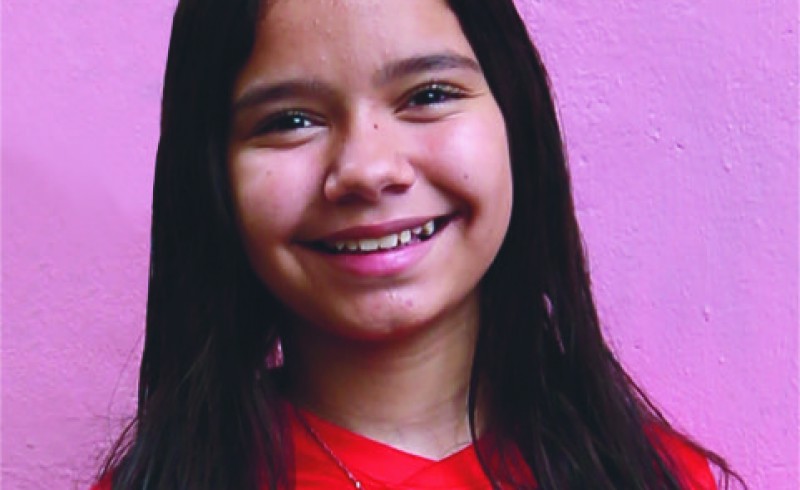
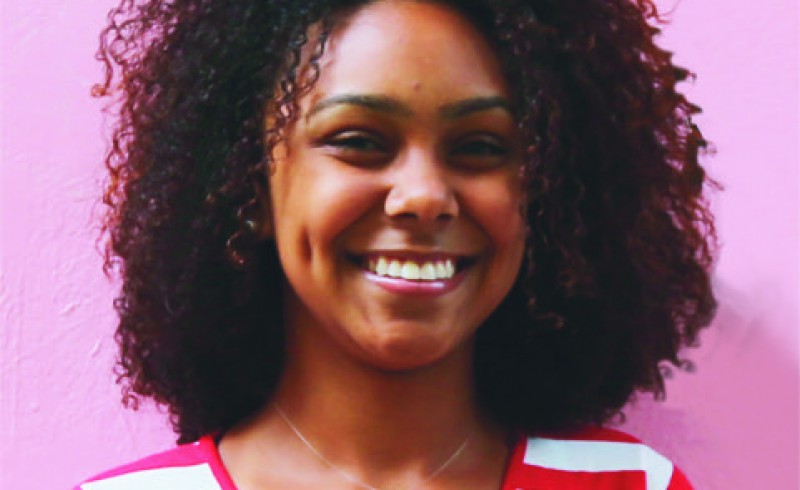
Other positives are the children of the violin group, whose performances become known in the city. The children eventually receive an invitation to Norway in 2018. The football team is going strong. The walls in the office of Projeto Uerê are stacked with trophies and one of the boys was discovered by a scout. The boy now trains with the Botafogo youth team and dreams of a football career.
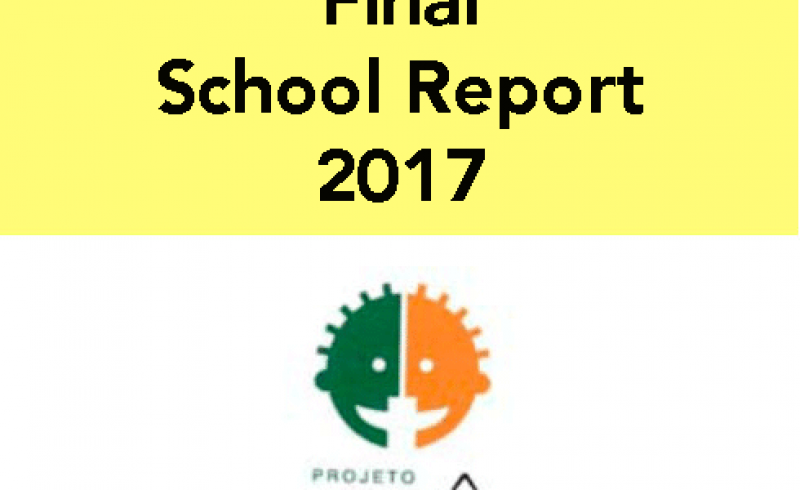
And last but not least, the teaching pedagogy in Projeto Uerê is being disseminated in projects and schools in other brasilian cities. Also schools in the hotspots of Nordrhein- Westfalen, in Sweden Poland and NGO’s in Greece are interested to learn more about the pedagogy to help staff in tackling the many difficulties of refugee or immigrant children. Therefore Yvonne de Mello is travelling a lot but she can do it as the staff in Projeto Uerê
Is well trained and motivated.
All this of course is only possible with the help of all our wonderful sponsors across the world and on behalf of our Uerê’s we thank each of you from the bottom of our heart and wish you a healthy and peaceful New Year.
Eritrea
In 2017 the rainy season unfortunately was one month short and in some areas there is hardly any vegetation. Farmers partly saw no alternative as to move with their cattle to somewhat more fertile regions with the result that overgrazing took place.
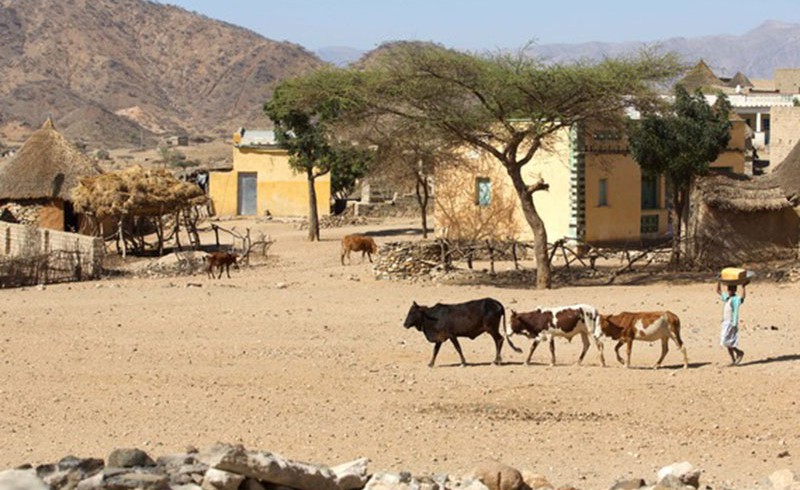
Whereas the government made enormous efforts to build water dams In many regions, the small water wells were dry and the villagers must walk 15 kilometres or more to reach a dam or another well to fetch water for their daily needs.
Whereas the men are serving in the army and boys look after the cattle and herds of goats, it is the task of the women and girls to fetch water and collect dry wood for the fire place.
It is very time consuming and hard work to walk in the heat and carry full water canisters to their homes. Apart from possible physical harm to their spines, the girls often are just too tired or too busy to regularly attend a school. Although primary education is mandatory, the school attendance in rural areas is often different – depending of the needs of the respective family.
A donkey to help carrying the heavy canisters makes all the difference. A donkey is resilient and frugal in grazing. A donkey can carry more than one canister of water per day and also carries wood or products to and from the nearby markets. An enormous relief for the mother who can focus more on growing some vegetables and enhancing the alimentation. Mothers, where the husband has died or disappeared, are being elected by local NGO’s (also the local nuns are doing amazing work) to receive a female donkey. The offspring helps to create a little wealth. The young donkey may be sold to buy chicken or goats. Again this contributes to the physical health of the children. The mother must promise not to sell her donkey (she never would) and to send her daughters to a nearby school.
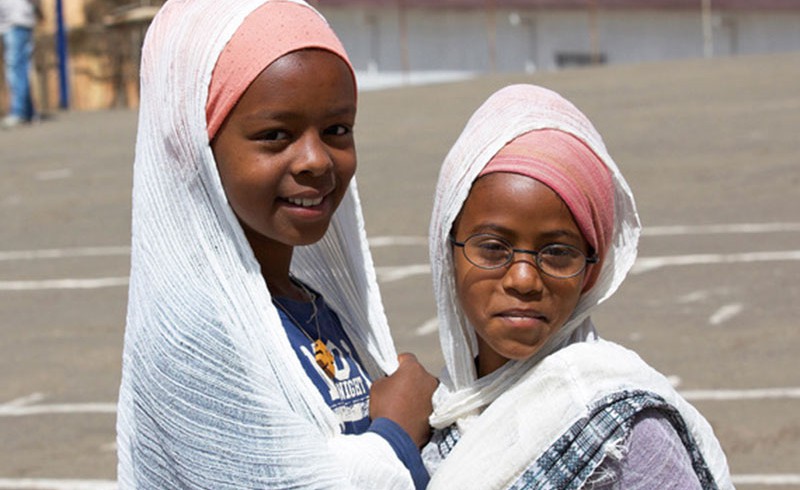
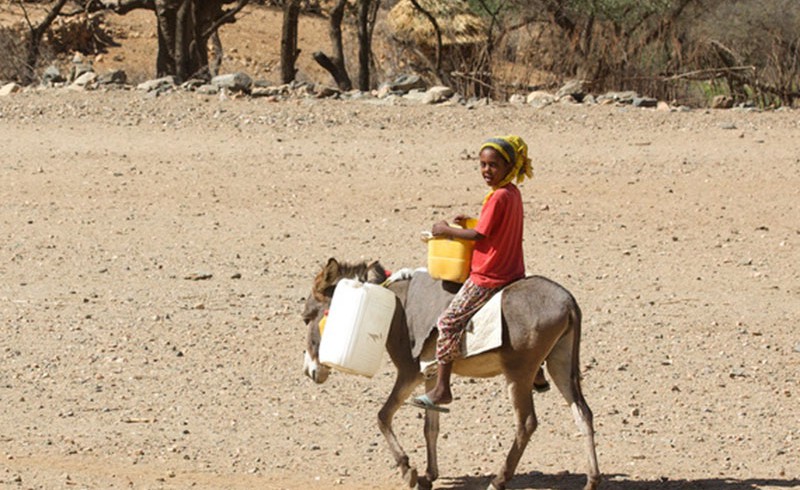
The only losses that may occur are occasional attacks of hyenas. ArcheMed is supporting a local NGO as well as catholic nuns of an Italian order to buy and distribute donkeys to needy families. A donation for a donkey is truly far reaching in a country like Eritrea. Many thanks to all the sponsors who help a mother help herself.